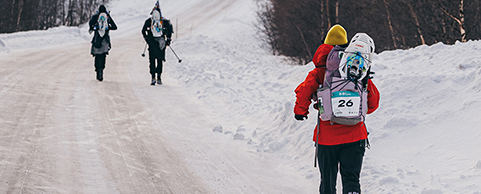Trail Running: How to fuel yourself during an endurance event

Endurance sporting events are a unique challenge, and in the world of trail running, ‘ultra’ events are becoming increasingly popular. An ‘ultra’, by the way, is anything longer than a marathon, which is 42.2km. Ultras typically range from anywhere between 50km to 100 miles (but it’s not uncommon for some events to be much longer!). If you’re thinking about undertaking an ultra-distance event, one question you might be asking is how to fuel your body during these events.
Below I’m going to cover 3 things:
- First, I’ll outline some basic rules of thumb.
- Second, I’ll provide a little background on why these rules of thumb are important.
- Third, I’ll offer two examples of how you might fuel yourself during an endurance event with different products.
Fuelling Your Run: Rules of thumb
Personally, I find the simplest way to think about endurance fuel is to split it into three categories. You want to consume...
- Between 0.14–0.27ml/kg/min of fluids (Holland, et al. 2017, 2269);
- Between 120–300 calories per hour;
- Between 30–90g carbohydrates per hour (Buell 2016, 298).
If you can balance these three things you’re well on your way. Of course, everyone is different, and every event is different – use this as a rough guide to get you started. Over time you’ll work out what works for you and you won’t even need to think about it. (By the way, since you’re hopefully well fuelled at the start of the event, you probably want to start your intake roughly 30–45min into the event and go hourly from there.)
Getting more specific
A friend of mine once looked at the ingredients list of one of my Tailwind packets (more on Tailwind below) and exclaimed incredulously: it’s just bloody sugar! It’s true, lots of sports nutrition bars, gels, and powders include a decent amount of glucose. Your body and brain rely on sugar – your body absorbs sugars into the blood and makes it available as energy.
We typically get the sugars we need from carbohydrates. The tricky thing with managing carbohydrates during an event, however, is that it’s easy to overdo it! Ever seen anyone going a little too hard on the free treats/snacks at the aid station? Remember that feeling (I’m sure you’ve experienced it) where you’ve got some form of gut cramp from eating too much and then tried to exercise? That’s your intestines trying to deal with an overload of carbohydrates. Particularly when they’re under stress, your intestines can only manage up to 60–90g of carbohydrates per hour. And even then, for those of us who are merely human, up 60g is probably enough – elite athletes consume up to 90g. Give your intestines too many carbohydrates to deal with at once and they’ll make you pay for it.
Generally, once you’ve attended to your carbohydrate needs, you’ll be in the ballpark of your calorie intake. Try to make sure the rest of your calories comprise some protein and (good) fat. Buell (2017, 296) writes that “current evidence-based guidelines for fuelling an endurance athlete include a diet high in carbohydrate and moderate in fat and protein”.
Finally – fluids. Maffetone and Allen (2010, 201) write: “It’s well known that water is the most important ergogenic [performance enhancing] aid in sports. Even minor deficiencies cause dehydration and can be devastating to your performance results. This same principle applies to electrolytes – reduced sodium content in the body, for example, will usually have major adverse effects on training and competition”. 'Nuff said…
But, again, don’t overdo it! Overhydration or “hyponatremia” is just as bad as dehydration.
“Sports drinks” are important. When you sweat, you sweat out more than just good ol’ H2O – you’re also losing a lot of sodium, for instance. So, if you only drink water while you’re exercising, you’re further diluting what remaining sodium is left in your body.
As you probably noted in my Rules of Thumb section above, water intake is tricky. It's highly dependent on the individual and the event. The jury is out on how much water we need to consume during endurance events. However, as outlined above, Holland et al. suggests that 0.14–0.27ml/kg/min is an appropriate reference for endurance events exceeding 3hrs, with the caveat that “until further research is conducted, these recommendations should be used as a guide to inform hydration practices” (2269). Using this model, someone who is 75kg should consume between 630–1215ml per hour.
While this might all seem a bit too much – can we just got out for a run already…? The good news is that there are a range of products that take care of all this stuff for you! And so long as you follow the basic rules of thumb outlined earlier, you’re good to go. Let’s consider a few examples.
Examples: Tailwind Nutrition and Skratch Labs
There are countless ways to balance the rules of thumb mentioned above – here I want to talk about two of my favourites.
- Tailwind: Tailwind is your one-stop-shop. It comes in powder form and you mix it with water. A single serve of Tailwind includes 200 calories, 50g of carbohydrates, and is typically mixed into 400–600ml of water – everything you need. Conveniently, most running soft flasks are 500ml. So, depending on your body mass and the event you’re undertaking, it may well be that one flask of Tailwind per hour is all you need all day long. And if you find you need a little more or a little less calories and carbohydrates, you can give yourself bigger or smaller scoops as necessary.
Tailwind comes in a variety of flavours. You can purchase them in single-serve sticks so you can try all the flavours, and if you decide it’s your thing, you can purchase your favourite flavour in larger servings too. It’s a good idea to try the flavours during a run – I find the flavours I want when I’m sitting on the couch are very different to the flavours I tend to like while I’m exercising. Handy tip – I avoided the “naked” flavour for far too long, thinking it would be weird. Turns out it’s my favourite!
Perhaps the only downside to Tailwind is that it’s so effective! So, it can be difficult to mix things up when you really just feel like chewing on something. For the most part, I don’t mind getting my carbohydrates and calories in liquid form, but some people need to chew something! If this is you, be careful about how you manage this with Tailwind. If you add anything extra, make sure you time it right so you don’t grossly increase your carbohydrate intake, for instance, and upset your intestines.
- Skatch Labs: If you like to sip your fluids and chew your calories, check out Skratch Labs energy bars and hydration mix. Add one scoop or sachet of their hydration mix to 500ml of water and on top of getting fluids and sodium, you get 80 calories (so you’ve got roughly another 40–220 to go if you’re aiming to sit between 120–300 calories an hour) and 21g of carbohydrates (you need another 9–69g to land between 30–90g per hour, for example). Enter the energy bars. One bar gives you 220 calories (putting you at the upper range of how many calories our bodies can handle per hour) and 33g of carbohydrates. Bingo – as much of the hydration mix as you need and one energy bar per hour and you’re all set.
But my favourite thing from Skratch Labs are the energy chews! One serve (each packet includes 2 servings) gives you 70 calories and 18g of carbohydrates. I tend to bring these with me as a flavour hit and an energy boost and I use them as a supplement with Tailwind – they’re not too calorie or carbohydrate heavy so you can usually include them without really having to worry that you’ll overdo anything.
I love the Skratch Labs hydration mix for shorter events or training runs, too. It’s great for those times when I want to replace my fluids and electrolytes but don’t need to the calories that come with Tailwind.
Final thoughts
The most important thing to remember is that everyone is different, and everyone’s body needs different things. Further, it’s not just: fuel = energy = good. We’re not steam engine trains where as long as we have enough coal going in, we’re good to go. The mental toil of endurance events is not to be underestimated. Sure – having the right fuel going in is certainly going to help your mental well-being during an event, but how you get the fuel is very personal. Some people need bananas, chips, sandwiches, caffeine, chocolate, and so forth. Indeed, biting into a piece of chocolate when you’ve been exercising for hours on end can be an immeasurable pick-me-up when you’re trying to muster the courage to make it the rest of the way up that very steep hill.
It’s important to test what works for you. You wouldn’t just randomly grab a pair of shoes off the shelf and then immediately attempt an endurance event in them – the same goes for nutrition. Chances are, you’ll get it wrong the first few times (word to the wise, take the necessary “equipment” with you when testing your fuelling strategy on training runs – nobody likes to talk about it, but you wouldn’t be the first person to have some sort of “emergency” a little farther away from home than you’d like. Of course, that “equipment” might just be a phone so you can call someone to come pick you up, should you be so lucky…). It’s also important to consider your everyday nutrition in the lead up to an event – if you’re iron deficient, for instance, you might be in for a rough time. If ever you’re struggling in training or racing, it might be worth having a chat with your GP to make sure everything is as it should be.
Happy running!

Sam McAuliffe,
Bogong Equipment
Sources
- Buell, J. 2016, “Optimizing Nutrition for Endurance Training”, in T. L. Miller (ed.), Endurance Sports Medicine: A Clinical Guide, Springer, pp. 295-304.
- Holland, J., Skinner, T. L., Irwin, C. G., Leveritt, M. D., Goulet, E. D. B. 2017, “The Influence of Drinking Fluid on Endurance Cycling Performance: A Meta-Analysis”, Sports Med, vol. 47, pp. 2269-2284.
- Maffetone, P. and Allen, M. 2010, The Big Book of Endurance Training and Racing, Skyhorse Publishing, New York.
See our range of trail running nutrition here.
Questions? Visit us, email us or call us (03 9600 0599).
More Articles
- VEGAN SHOES FOR THE OUTDOORS
- PLB: ABOUT PERSONAL LOCATOR BEACONS
- TRAIL RUNNING: HOW MUCH WATER SHOULD YOU CARRY?
- MORE RESOURCES...


















